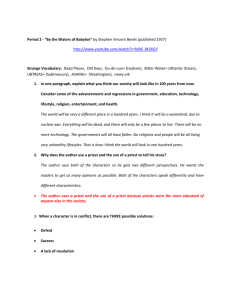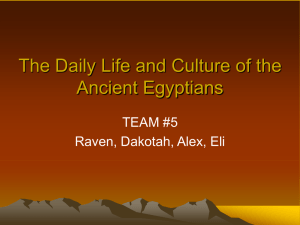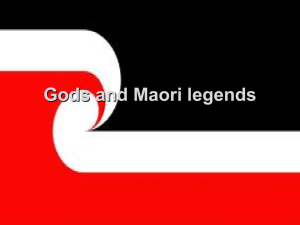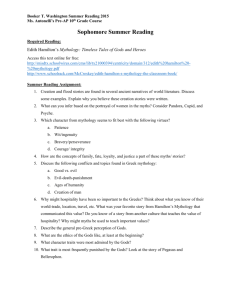Discussion Questions for By the Waters of Babylon
advertisement
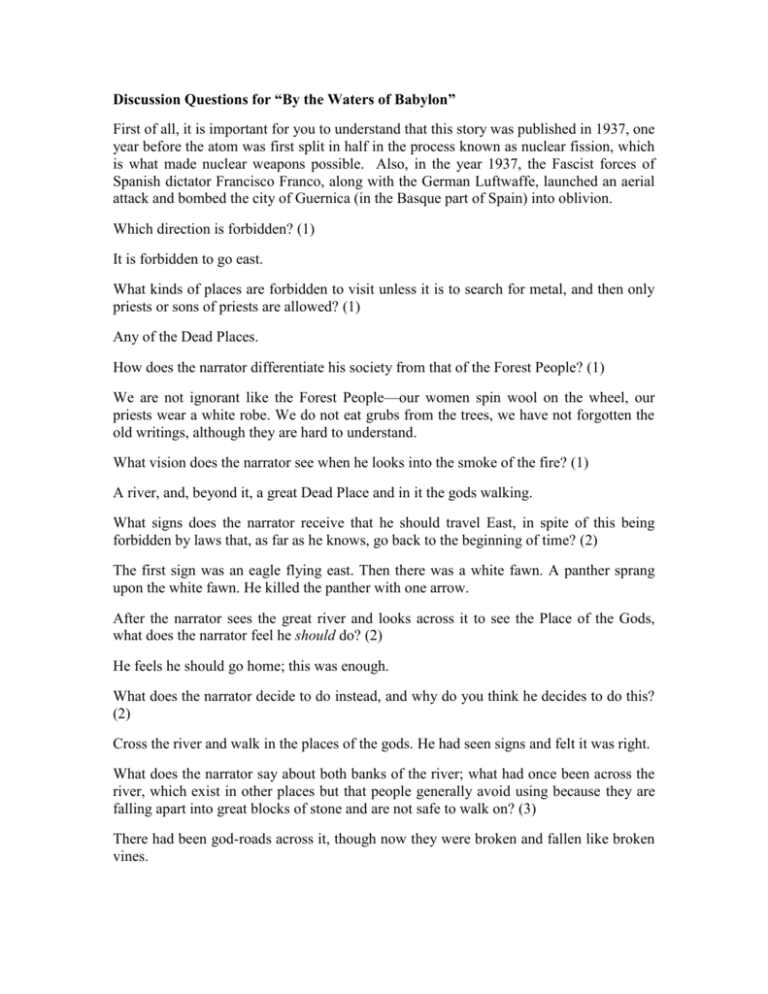
Discussion Questions for “By the Waters of Babylon” First of all, it is important for you to understand that this story was published in 1937, one year before the atom was first split in half in the process known as nuclear fission, which is what made nuclear weapons possible. Also, in the year 1937, the Fascist forces of Spanish dictator Francisco Franco, along with the German Luftwaffe, launched an aerial attack and bombed the city of Guernica (in the Basque part of Spain) into oblivion. Which direction is forbidden? (1) It is forbidden to go east. What kinds of places are forbidden to visit unless it is to search for metal, and then only priests or sons of priests are allowed? (1) Any of the Dead Places. How does the narrator differentiate his society from that of the Forest People? (1) We are not ignorant like the Forest People—our women spin wool on the wheel, our priests wear a white robe. We do not eat grubs from the trees, we have not forgotten the old writings, although they are hard to understand. What vision does the narrator see when he looks into the smoke of the fire? (1) A river, and, beyond it, a great Dead Place and in it the gods walking. What signs does the narrator receive that he should travel East, in spite of this being forbidden by laws that, as far as he knows, go back to the beginning of time? (2) The first sign was an eagle flying east. Then there was a white fawn. A panther sprang upon the white fawn. He killed the panther with one arrow. After the narrator sees the great river and looks across it to see the Place of the Gods, what does the narrator feel he should do? (2) He feels he should go home; this was enough. What does the narrator decide to do instead, and why do you think he decides to do this? (2) Cross the river and walk in the places of the gods. He had seen signs and felt it was right. What does the narrator say about both banks of the river; what had once been across the river, which exist in other places but that people generally avoid using because they are falling apart into great blocks of stone and are not safe to walk on? (3) There had been god-roads across it, though now they were broken and fallen like broken vines. When the narrator gets to the Place of the Gods, what does he realize about some of the things he has heard said about this place? (3) It is not true what some of the tales say, that the ground there burns forever. Here and there were the marks and stains of the Great Burning, on the ruins, that is true. But they were old marks and old stains. It is not true either, what some of our priests say, that it is an island covered with fogs and enchantments. It is not. It is a great Dead Place—greater than any Dead Place we know. Everywhere in it there are god-roads, though most are cracked and broken. Everywhere there are the ruins of the high towers of the gods. What does the narrator say about what the gods used to eat? (4) It is known that the gods did not hunt as we do—they got their food from enchanted boxes and jars. They used to have fruit from jars and also drinks that were in bottles made out of glass. What had the narrator done once when he was a child exploring a Dead Place, for which his father punished him strictly? (4) He had opened such a jar (containing the food of the gods) and tasted it and found the food sweet. Why was it forbidden to eat the food of the gods? (4) Often, that food is death. When the narrator has awoken from his brief sleep and finds that the wild dogs are following him, how does he escape from them? (4) He goes into the door of a tall building and shuts the strong metal door behind him. Then he climbs the stairs. How does the narrator describe the building (and its rooms and what is in the rooms)? (45) It was very rich, with few broken windows although they are streaked with dust. There are carpets on the floors, not too faded. The chairs are soft and deep. There are paintings on the wall, one of which is of a bunch of flowers in a jar. There is a clay sculpture of a bird. There are books in many languages. There is a washing place (a sink) but no water, with one handle labeled ‘Hot’ and the other labeled ‘Cold,’ and a cooking-place but no wood, and things that look like lamps but without oil or wicks. It is dry and dusty. Describe the narrator’s dream/vision. What does he believe he is seeing? (5) He believes his spirit has stepped out of his body and that he sees the city of the gods as it was when the gods were alive. It is lit up at night. The god-roads are unbroken. The gods burrow in tunnels under rivers and fly through the air. They use unbelievable tools to do giant works, and can summon things to themselves from the other side of the world. Then he sees the gods at war, fire raining from the sky and a poisonous mist. The gods run about like ants. A few escape. The poison remains in the ground for many years after. He sees the last of the gods die, and then darkness over the broken city. When the narrator sees a dead and naturally mummified god sitting in a chair, what does he realize about the gods? (6) They had been men, neither gods nor demons. When the narrator returns to his people, what does he tell his father? (6) “Father, they were men! I have been in the Place of the Gods and seen it! Now slay me, if it is the law—but still I know they were men.” How does the narrator’s father react to what he has to say? What does he say they should do about this knowledge? (6) He said, “The law is not always the same shape—you have done what you have done. I could not have done it my time, but you come after me … Truth is a hard deer to hunt. If you eat too much truth at once, you may die of the truth. It was not idly that our fathers forbade the Dead Places.” Basically his father tells him they should not yet tell their people that the gods were men. It is better if the truth comes out little by little. When they go to the Dead Places now, for what else do they look besides just metal? Why do they look for these other things? (6) The books and the writings of ‘the gods’ and their broken tools. The narrator wants to understand more about them and how they lived. What does the narrator want to do when he becomes chief priest? (6) He wants them to go beyond the great river to the Place of the Gods—the place newyork—as a company, and look for the images of the gods and find the god ASHING and the others—the gods Lincoln and Biltmore and Moses. He feels that they must build again, like those men (whom he had previously thought were gods) did before the time of the Great Burning and the Destruction. By the end of the story, what can we infer about the Place of the Gods, and what has happened to it (it might have been a nuclear war, since sci-fi speculated about nuclear weapons even before the atom was first split in 1938, one year after the author published this story)? There was a devastating war (perhaps fire-bombings) that destroyed New York City, the ruins of which are now regarded as the Place of the Gods. Who was the statue he saw—which he thinks is named ASHING—actually of? George Washington. In the story, John talks about how he must cross mountains; he is referring to what we call the Appalachian Mountains. John travels East from the mountains to the great river, Ou-dis-sun, which we know as the Hudson River. John looks down at the river from a series of great cliffs, which may be presumed to be the New Jersey Palisades. After building a raft and floating down the river, John gets to the Place of the Gods with the great ruins. At the Place of the Gods, John comes across the remains of a statue with the word "ASHING" which could be presumed to be a statue of George Washington, and finds a ruined building named "UBTREAS" (the United States Sub-Treasury building on Wall Street is better known as the Federal Hall National Memorial). John walks through a building with stars on the ceiling and tunnels; this is the place that we call Grand Central Terminal. After running from the dogs, John stays in a place called the Biltmore, which would be the famous New York Biltmore Hotel. Why would this short story not work as effectively if it was told in the third-person objective and omniscient perspective or as a movie? Because it would be obvious from the get-go that the Place of the Gods is actually a ruined New York City; there would be no ‘surprise twist’ at the end. United States Sub-Treasury (Federal Hall National Memorial) Grand Central Terminal The Biltmore Hotel



